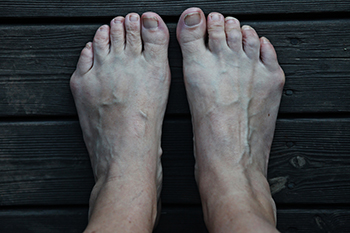Many people have seen, or experienced, a bunion on the big toe. But a less common type of bunion, which can form at the base of the little toe, is often referred to as a bunionette. It can be very painful, especially if it frequently rubs against a tight-fitting shoe. A bunionette usually occurs when the metatarsal bone of the midfoot angles outward and the little toe points inward and becomes deformed at its base. Simple treatments are often successful, such as wearing shoes with a wider toe box, using a toe spacer between the 4th and 5th toe, or simply padding the area to reduce irritation from your shoes. It may also help to do less standing or walking. If these measures fail to bring relief and the pain from a bunionette increases, it is best to consult a podiatrist who can X-ray your foot and offer a treatment plan that is appropriate.
If you are suffering from bunions, contact one of our podiatrists of Associates in Podiatry, PC. Our doctors can provide the care you need to keep you pain-free and on your feet.
What Is a Bunion?
A bunion is formed of swollen tissue or an enlargement of boney growth, usually located at the base joint of the toe that connects to the foot. The swelling occurs due to the bones in the big toe shifting inward, which impacts the other toes of the foot. This causes the area around the base of the big toe to become inflamed and painful.
Why Do Bunions Form?
Genetics – Susceptibility to bunions are often hereditary
Stress on the feet – Poorly fitted and uncomfortable footwear that places stress on feet, such as heels, can worsen existing bunions
How Are Bunions Diagnosed?
Doctors often perform two tests – blood tests and x-rays – when trying to diagnose bunions, especially in the early stages of development. Blood tests help determine if the foot pain is being caused by something else, such as arthritis, while x-rays provide a clear picture of your bone structure to your doctor.
How Are Bunions Treated?
- Refrain from wearing heels or similar shoes that cause discomfort
- Select wider shoes that can provide more comfort and reduce pain
- Anti-inflammatory and pain management drugs
- Orthotics or foot inserts
- Surgery
If you have any questions, please feel free to contact our offices located in Pittsburgh-South Hills, and Pittsburgh-Bellevue, PA . We offer the newest diagnostic and treatment technologies for all your foot care needs.





